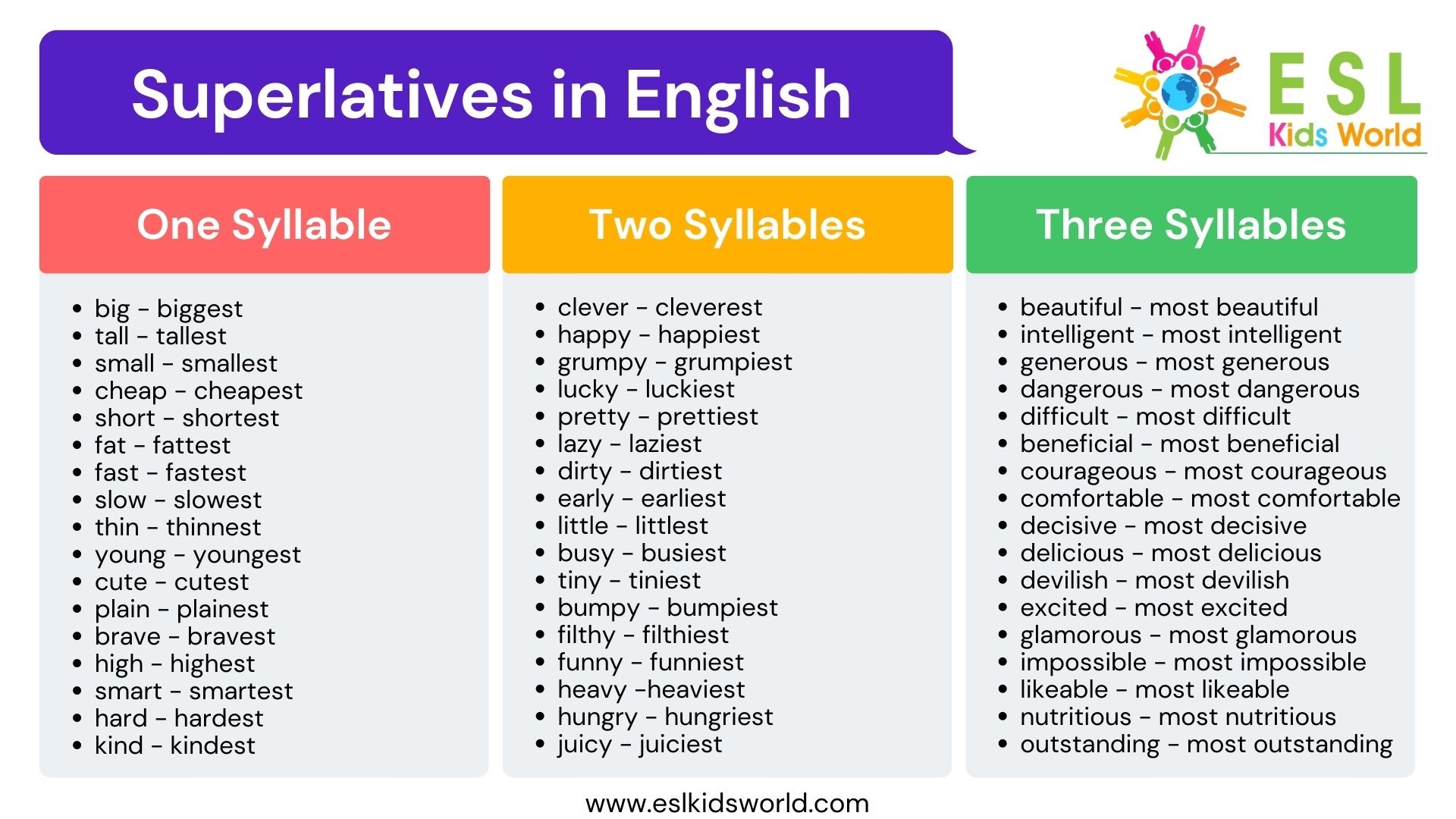Superlatives examples are essential for expressing the highest degree of comparison in English. Whether you're a student, teacher, or language enthusiast, understanding superlatives will enhance your communication skills. This article delves deep into the world of superlatives, offering practical examples and expert insights to help you master this fundamental grammar concept.
Language is a powerful tool that shapes how we communicate and express ideas. Among the many elements of grammar, superlatives play a crucial role in emphasizing superiority, uniqueness, or extremes. By mastering superlatives, you can convey messages with greater clarity and impact.
In this comprehensive guide, we will explore various superlatives examples, their usage, and practical applications. Whether you're looking to improve your writing, ace an exam, or simply expand your linguistic knowledge, this article has everything you need to succeed.
Table of Contents
- What Are Superlatives?
- How to Form Superlatives
- Common Superlatives Examples
- Superlatives in Everyday Life
- Exceptions and Rules
- Superlatives vs. Comparatives
- Practical Uses of Superlatives
- Superlatives in Literature
- Frequently Asked Questions
- Conclusion
What Are Superlatives?
Superlatives are adjectives or adverbs used to describe the highest or lowest degree of comparison. For example, "fastest," "tallest," and "most beautiful" are all superlatives. They help us emphasize the superiority, inferiority, or extremity of something.
In English grammar, superlatives are an integral part of comparative structures. They allow speakers and writers to make bold statements, such as "Mount Everest is the highest mountain in the world" or "She is the smartest person I know."
Understanding superlatives is vital for effective communication. They add depth and clarity to your expressions, making them indispensable in both formal and informal contexts.
How to Form Superlatives
Regular Superlatives
Forming superlatives is relatively straightforward for most adjectives. For one-syllable words, you typically add "-est" to the base form. For example:
- Fast → Fastest
- Small → Smallest
For two-syllable words ending in "y," change the "y" to "i" and add "-est." For example:
- Happy → Happiest
- Early → Earliest
Irregular Superlatives
Some adjectives have irregular superlative forms that don't follow standard rules. Common examples include:
- Good → Best
- Bad → Worst
- Far → Furthest
It's essential to memorize these irregular forms as they are frequently used in everyday language.
Common Superlatives Examples
Here are some common superlatives examples to help you grasp their usage:
- The Amazon River is the longest river in the world.
- She is the most talented artist in the class.
- This is the best restaurant I've ever visited.
These examples demonstrate how superlatives enhance the meaning of sentences by emphasizing extremes or superiority.
Superlatives in Everyday Life
Superlatives are not just confined to academic or formal settings. They are widely used in everyday conversations, advertisements, and media. For instance:
- Adverts often use superlatives like "best deal" or "cheapest prices" to attract customers.
- News headlines frequently employ superlatives to grab attention, such as "Record-breaking performance" or "Most popular movie of the year."
By incorporating superlatives into your daily speech, you can make your communication more engaging and persuasive.
Exceptions and Rules
While most superlatives follow standard rules, there are exceptions to consider. For example:
- Adjectives with more than two syllables usually take "most" before them. For instance, "intelligent" becomes "most intelligent."
- Some adjectives with two syllables can take either "-est" or "most," depending on usage. For example, "clever" can be "cleverest" or "most clever."
Being aware of these exceptions will help you use superlatives more accurately and confidently.
Superlatives vs. Comparatives
Understanding the Difference
While both superlatives and comparatives involve comparison, they serve different purposes. Comparatives focus on comparing two things, while superlatives highlight the highest or lowest degree among a group. For example:
- Comparative: John is taller than Mike.
- Superlative: John is the tallest person in the room.
Recognizing this distinction will improve your grammatical accuracy and clarity.
Practical Uses of Superlatives
Superlatives have numerous practical applications across various fields. In business, they are used to highlight product advantages, such as "the fastest processor" or "the most reliable service." In science, superlatives describe groundbreaking discoveries, like "the largest black hole ever observed."
Education also benefits from superlatives, as they help students understand concepts like "the most significant historical event" or "the most influential scientist."
Superlatives in Literature
Literature often employs superlatives to create vivid imagery and evoke emotions. Writers use them to describe characters, settings, and events with unparalleled intensity. For example:
- Shakespeare's "Romeo and Juliet" features lines like "the fairest stars in heaven."
- Modern novels frequently use superlatives to build suspense or emphasize key moments.
By studying superlatives in literature, you can appreciate their role in shaping powerful narratives.
Frequently Asked Questions
What Are Some Common Mistakes When Using Superlatives?
A common mistake is overusing superlatives, which can dilute their impact. Additionally, forgetting to add "-est" or "most" can lead to grammatical errors. Always double-check your usage to ensure accuracy.
Can Superlatives Be Used in Formal Writing?
Yes, superlatives are appropriate in formal writing when used judiciously. They can add emphasis and clarity to academic papers, reports, or official documents.
Are There Any Cultural Differences in Using Superlatives?
Cultural norms may influence how superlatives are perceived. In some cultures, excessive use of superlatives might be seen as exaggeration, while in others, it's a common practice. Being mindful of cultural nuances can enhance cross-cultural communication.
Conclusion
Superlatives examples are a vital component of English grammar, enabling us to express extremes and superiority with precision. By mastering their formation and usage, you can elevate your communication skills and convey ideas more effectively.
We encourage you to practice using superlatives in your daily conversations and writing. Share your thoughts and experiences in the comments below. For more insightful articles on grammar and language, explore our website and stay updated on the latest linguistic trends.
Thank you for reading, and happy learning!


